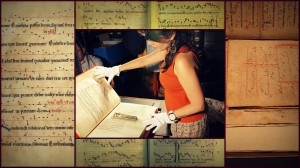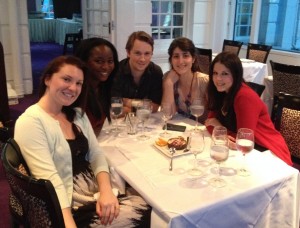Exchanging the Middle Ages

In one of our final posts before breaking for the summer, another recent guest talks about her exchange visit to Southampton from her university in Spain: My name is Nuria Torres and I’m a PhD student at the Complutense University of Madrid, where I’m working on my PhD thesis on medieval music under the supervision of Carmen Julia Gutiérrez. This year I decided to do a research stay abroad at the University of Southampton in order to go forward in my research and share different points of view with various researchers.
One of the main reasons why I’ve chosen the University of Southampton for a research stay is Professor Mark Everist. Beside the research work, I have established contact and held meetings with Professor Everist, who has followed closely the evolution of my research and has always helped me. Professor Everist is one of the world’s leading specialists in polyphony of the thirteenth century, being the author of Polyphonic Music in Thirteenth-Century France (1989) and French Motets in the Thirteenth Century (1994,) and editor of three volumes of Magnus Liber Organi Editions by l’Oiseau Lyre (2001-2003) and six collections of essays. He directs six doctoral theses on this topic and coordinates a research project perfectly suited to the interests of my investigation: Cantum pulcriorem invenire: Thirteenth-Century Music and Poetry. This project studies the conductus between 1170 and 1320.
Likewise in the department there are some other important researchers who have made great contributions to my research because they are specialists in Middle Ages, Renaissance, secular song or music publishing, as Jeanice Brooks, Andrew Pinnock, Laurie Stras, Stephen Rice and Gregorio Bevilacqua. With the latter I’ve had the opportunity to exchange opinions about different fragments of polyphony in Spain.
Thanks to this stay I’ve been able to attend the international research congress entitled Montpellier 8, organized by Professors Catherine Bradley, Karen Desmond and Elizabeth Eva Leach, at Saint Hugh’s College of Oxford University, on 20th and 21st March. Attendance at this conference has helped me meeting and maintaining contact with other researchers specialized in the period of my thesis.

The best thing of doing a thesis is to share it with the others, exchange different points of view and share opinions and discuss them. That’s how doctoral students in musicology at the University of Southampton consider it. Each month they meet at seminars to share their research work. These seminars are organized by Jacopo Mazzeo, who has helped me hugely with my stay, especially solving for me the most absurd questions that you can imagine. Thank you for everything, Jacopo.
In addition, most Tuesdays there are research seminars on various topics, where teachers and students meet guest lecturers. At the end of the seminar and discussion, we all go to the cafeteria to have a glass of wine. It’s a good opportunity to relate with the rest and exchange views.
Arriving in a foreign country is never easy. There are always drawbacks but, if you manage them well, you can turn them into advantages. I suggest you to come to study at the University of Southampton because its atmosphere and vitality make you feel at home.
